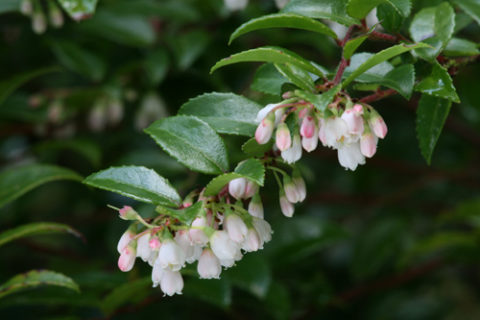
Choosing native plants is one way to reduce pesticide use. Evergreen huckleberry (Vaccinium ovatum) is an attractive, reliable shrub. It grows in shade as well as sun and requires little care. Photo: Richie Steffen, Great Plant Picks.
April is Earth Month. Each week this month we will feature a blog post about steps you can take to help protect our planet.
This week’s feature is water quality. The steps you take in your yard and garden can have a big impact on how clean our lakes and streams are.
Protect water quality: Reduce or eliminate pesticide use
In 2014 the US Geological Survey reported that the number of urban waterways contaminated with pesticides had increased. In the 1990s scientists found pesticides in 53 percent of urban stream. By the following decade, they found pesticides in 90 percent of urban waterways. Most pesticides were found at low levels, which could harm aquatic life like fish, frogs and insects.
Here are some good ways to reduce or eliminate pesticide use.
- Choose native plants or plant varieties that will grow well in our Northwest climate. They will be less susceptible to insects and diseases. Here are some native plant resources. And Great Plant Picks has extensive lists of plants that will grow well in the maritime Northwest. Or talk to us about designing a landscape with plants that will grow well on your site.
- Place plants properly in the landscape (e.g., sun-loving plants won’t grow well in the shade).
- Keep plants healthy with the right amount of water and organic fertilizers. Watch our video on Watering 101.
- Grow a thick, healthy lawn that can outcompete weeds. And don’t expect to grow a perfect lawn with absolutely no weeds. Here are some tips for natural lawn care. We can help you grow a lush lawn naturally; contact us about what your lawn may need.
- Learn more about managing pests and choosing the least-toxic methods in Grow Smart, Grow Safe.
Protect water quality: Mulch garden beds
Here is some information from a local nursery about how to use mulch and our video about choosing and using mulch.
Protect water quality: Choose organic or slow-release fertilizers
Organic and slow-release fertilizers feed your plants and lawn slowly over time. They are less likely to run off and harm water quality. Learn more about fertilizers and how to choose them in Grow Smart, Grow Safe.
Protect water quality: Reduce water use
- Choose drought-tolerant plants that will need less water. And group plants with similar water needs together for efficient watering. Find out more about choosing the right plants. And check out this plant list.
- Use efficient irrigation methods such as water timers and drip irrigation. If you have an automatic irrigation system, use smart controllers that adjust for the amount of rain. Watch our videos on water timers, watering systems (such as water wands and sprinklers), and rain gauges and sensors.
Protect water quality: Reduce runoff
What steps will you take to protect water quality in your landscape?
